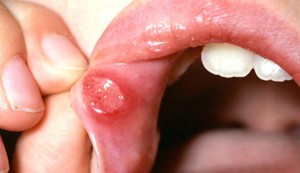 Around one in five people in the United Kingdom get them repeatedly, they are oval sores that form in your mouth and are usually white, red, yellow or grey in colour and are inflamed. We are of course talking about mouth ulcers.
Around one in five people in the United Kingdom get them repeatedly, they are oval sores that form in your mouth and are usually white, red, yellow or grey in colour and are inflamed. We are of course talking about mouth ulcers.
Although ulcers can be uncomfortable, especially when you eat, drink or brush your teeth, they are usually harmless and should heal within 10-14 days. If your ulcer gets worse or lasts for more than three weeks, see your local GP or dentist. In a small number of cases, a long-lasting mouth ulcer could be a sign of mouth cancer.
Mouth ulcers are often caused by damage to the mouth, for example by accidentally biting the inside of your cheek while eating, or from a sharp tooth, food or filling.
Mr Rhodri Williams, consultant maxillofacial surgeonat Solihull Hospital, highlights some other causes: “You can get mouth ulcers that keep coming back, mainly at times when you’re particularly stressed, anxious or run down.
“Your diet can play a part too and there are foods that may increase the likelihood of you getting a mouth ulcer including: chocolate, coffee, peanuts, almonds, strawberries, cheese, tomatoes and wheat flour.
“Stopping smoking may mean that you temporarily develop mouth ulcers, which is a normal reaction while your body is coping with chemical changes. If you are trying to quit smoking, don’t be put off if you develop mouth ulcers. Ulcers are temporary and the long-term health benefits of not smoking are far greater than the short-term discomfort of the ulcers.”
So what can you do to prevent getting mouth ulcers? Mr Williams explains: “Try to keep your mouth as clean and healthy as possible and use a soft toothbrush to clean your teeth.
“Avoid hard, sharp, spicy and acidic foods and drinks until the ulcer heals – try and stick to soft foods that are easier to chew. Eating a good diet which is rich in vitamins A, C and E, and includes foods such as fresh fruit and vegetables will help to reduce the risk of developing ulcers.
“As mouth ulcers can come about if you are feeling stressed, you can reduce your stress levels by doing an activity that you find relaxing, such as yoga, meditation or exercise.”
For more information on mouth ulcers, visit the NHS Choices website (www.nhs.uk).






